Literature Review: Cross-Cultural Management and Global Leadership
VerifiedAdded on 2021/06/17
|11
|2612
|388
Literature Review
AI Summary
This literature review explores the evolution and significance of cross-cultural management in the context of global leadership. It examines the impact of cultural diversity on organizational behavior, emphasizing the need for effective management strategies to accommodate diverse cultural practices. The review delves into the relationship between culture and business, the challenges faced by multinational corporations (MNCs), and the importance of cross-cultural communication. It discusses key theories such as Hofstede's model, which provides insights into cultural dimensions affecting employee behavior. The review highlights the strengths of cross-cultural management, such as fostering innovation and improving cultural awareness, while also acknowledging the need for continuous development in this area. The review also covers cross-cultural communication, its various contexts, and the need for skills such as mindfulness and behavioral flexibility. The conclusion underscores the importance of cross-cultural management in shaping communication methods and addressing challenges posed by cultural diversity, essential for the success of multinational corporations.
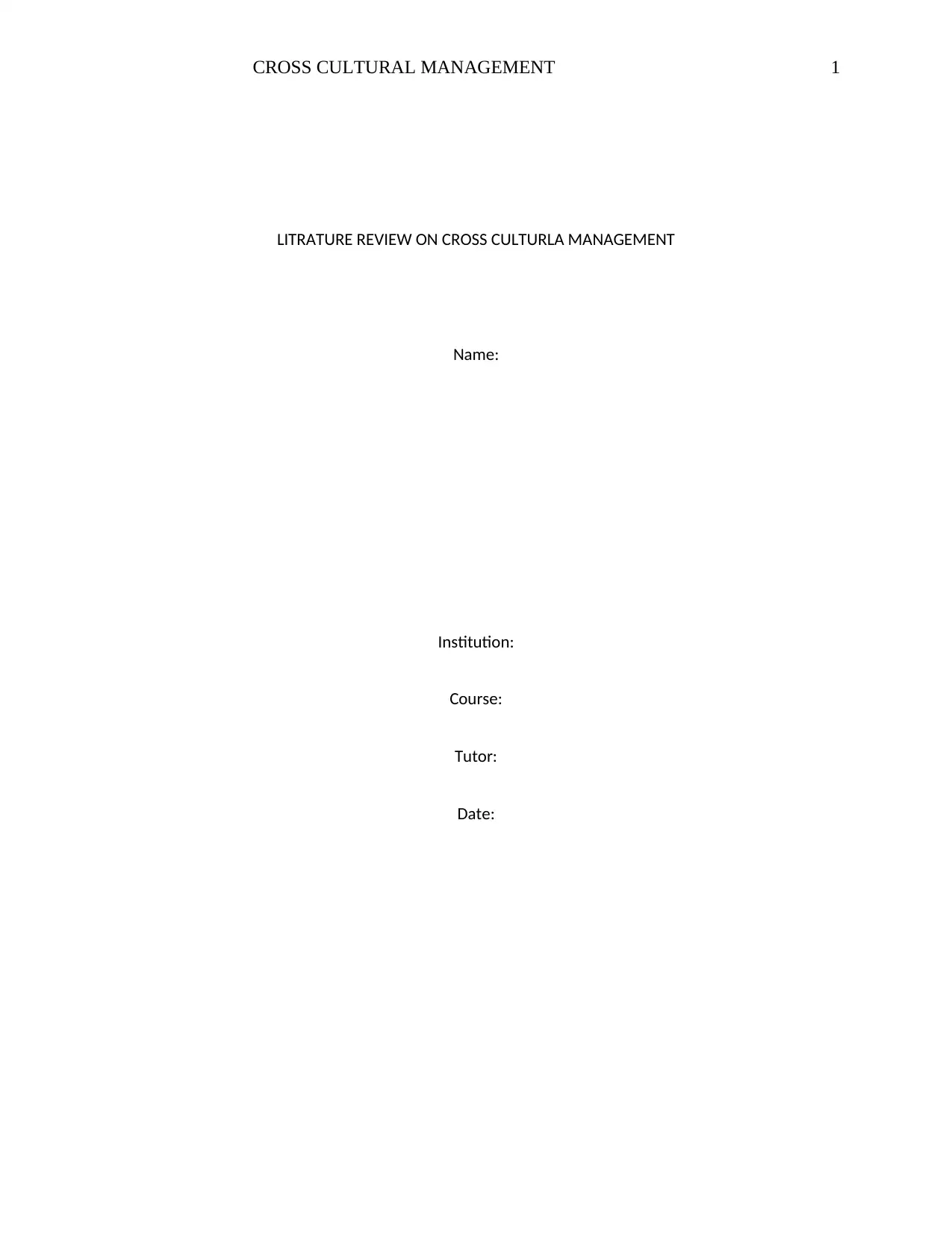
CROSS CULTURAL MANAGEMENT 1
LITRATURE REVIEW ON CROSS CULTURLA MANAGEMENT
Name:
Institution:
Course:
Tutor:
Date:
LITRATURE REVIEW ON CROSS CULTURLA MANAGEMENT
Name:
Institution:
Course:
Tutor:
Date:
Paraphrase This Document
Need a fresh take? Get an instant paraphrase of this document with our AI Paraphraser
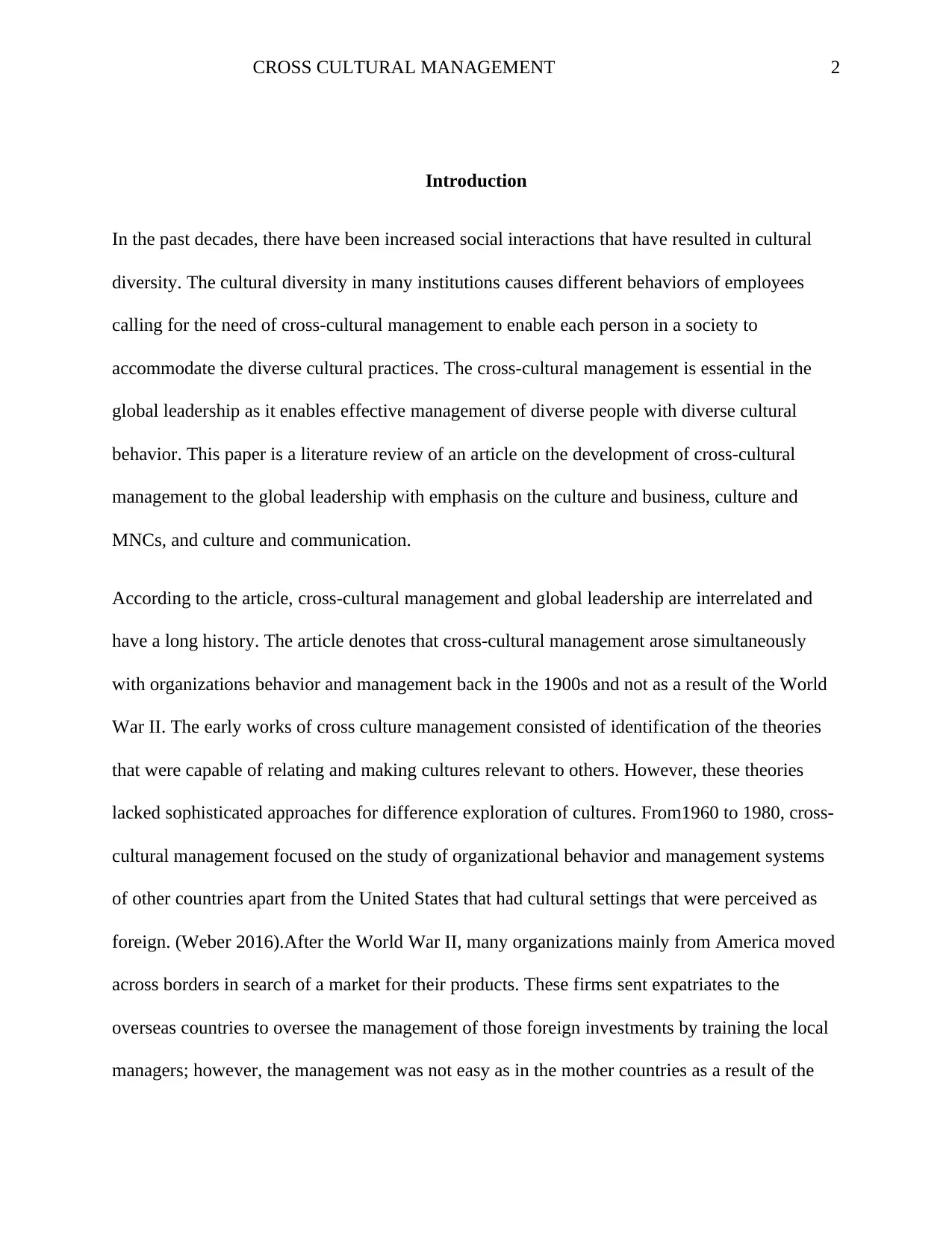
CROSS CULTURAL MANAGEMENT 2
Introduction
In the past decades, there have been increased social interactions that have resulted in cultural
diversity. The cultural diversity in many institutions causes different behaviors of employees
calling for the need of cross-cultural management to enable each person in a society to
accommodate the diverse cultural practices. The cross-cultural management is essential in the
global leadership as it enables effective management of diverse people with diverse cultural
behavior. This paper is a literature review of an article on the development of cross-cultural
management to the global leadership with emphasis on the culture and business, culture and
MNCs, and culture and communication.
According to the article, cross-cultural management and global leadership are interrelated and
have a long history. The article denotes that cross-cultural management arose simultaneously
with organizations behavior and management back in the 1900s and not as a result of the World
War II. The early works of cross culture management consisted of identification of the theories
that were capable of relating and making cultures relevant to others. However, these theories
lacked sophisticated approaches for difference exploration of cultures. From1960 to 1980, cross-
cultural management focused on the study of organizational behavior and management systems
of other countries apart from the United States that had cultural settings that were perceived as
foreign. (Weber 2016).After the World War II, many organizations mainly from America moved
across borders in search of a market for their products. These firms sent expatriates to the
overseas countries to oversee the management of those foreign investments by training the local
managers; however, the management was not easy as in the mother countries as a result of the
Introduction
In the past decades, there have been increased social interactions that have resulted in cultural
diversity. The cultural diversity in many institutions causes different behaviors of employees
calling for the need of cross-cultural management to enable each person in a society to
accommodate the diverse cultural practices. The cross-cultural management is essential in the
global leadership as it enables effective management of diverse people with diverse cultural
behavior. This paper is a literature review of an article on the development of cross-cultural
management to the global leadership with emphasis on the culture and business, culture and
MNCs, and culture and communication.
According to the article, cross-cultural management and global leadership are interrelated and
have a long history. The article denotes that cross-cultural management arose simultaneously
with organizations behavior and management back in the 1900s and not as a result of the World
War II. The early works of cross culture management consisted of identification of the theories
that were capable of relating and making cultures relevant to others. However, these theories
lacked sophisticated approaches for difference exploration of cultures. From1960 to 1980, cross-
cultural management focused on the study of organizational behavior and management systems
of other countries apart from the United States that had cultural settings that were perceived as
foreign. (Weber 2016).After the World War II, many organizations mainly from America moved
across borders in search of a market for their products. These firms sent expatriates to the
overseas countries to oversee the management of those foreign investments by training the local
managers; however, the management was not easy as in the mother countries as a result of the
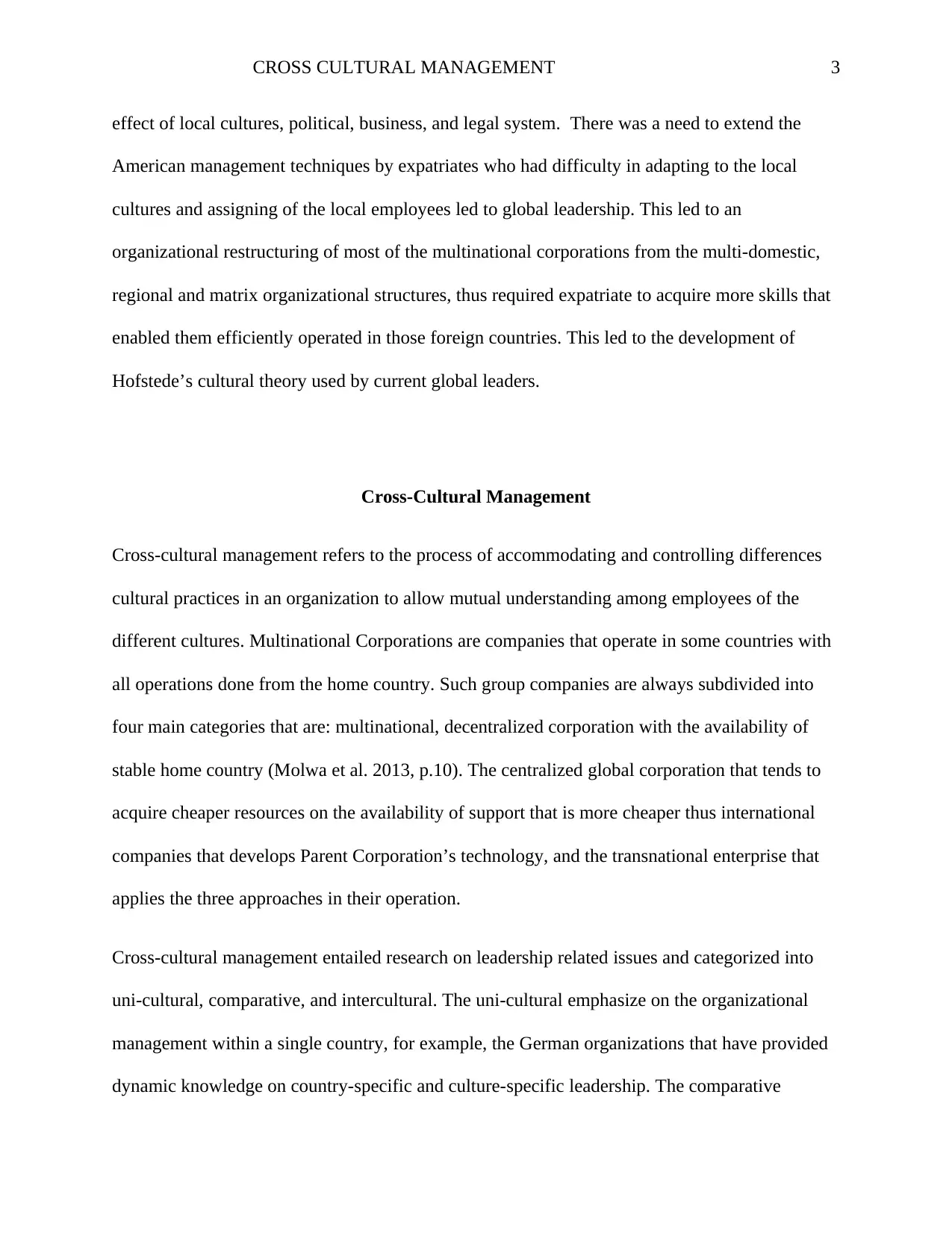
CROSS CULTURAL MANAGEMENT 3
effect of local cultures, political, business, and legal system. There was a need to extend the
American management techniques by expatriates who had difficulty in adapting to the local
cultures and assigning of the local employees led to global leadership. This led to an
organizational restructuring of most of the multinational corporations from the multi-domestic,
regional and matrix organizational structures, thus required expatriate to acquire more skills that
enabled them efficiently operated in those foreign countries. This led to the development of
Hofstede’s cultural theory used by current global leaders.
Cross-Cultural Management
Cross-cultural management refers to the process of accommodating and controlling differences
cultural practices in an organization to allow mutual understanding among employees of the
different cultures. Multinational Corporations are companies that operate in some countries with
all operations done from the home country. Such group companies are always subdivided into
four main categories that are: multinational, decentralized corporation with the availability of
stable home country (Molwa et al. 2013, p.10). The centralized global corporation that tends to
acquire cheaper resources on the availability of support that is more cheaper thus international
companies that develops Parent Corporation’s technology, and the transnational enterprise that
applies the three approaches in their operation.
Cross-cultural management entailed research on leadership related issues and categorized into
uni-cultural, comparative, and intercultural. The uni-cultural emphasize on the organizational
management within a single country, for example, the German organizations that have provided
dynamic knowledge on country-specific and culture-specific leadership. The comparative
effect of local cultures, political, business, and legal system. There was a need to extend the
American management techniques by expatriates who had difficulty in adapting to the local
cultures and assigning of the local employees led to global leadership. This led to an
organizational restructuring of most of the multinational corporations from the multi-domestic,
regional and matrix organizational structures, thus required expatriate to acquire more skills that
enabled them efficiently operated in those foreign countries. This led to the development of
Hofstede’s cultural theory used by current global leaders.
Cross-Cultural Management
Cross-cultural management refers to the process of accommodating and controlling differences
cultural practices in an organization to allow mutual understanding among employees of the
different cultures. Multinational Corporations are companies that operate in some countries with
all operations done from the home country. Such group companies are always subdivided into
four main categories that are: multinational, decentralized corporation with the availability of
stable home country (Molwa et al. 2013, p.10). The centralized global corporation that tends to
acquire cheaper resources on the availability of support that is more cheaper thus international
companies that develops Parent Corporation’s technology, and the transnational enterprise that
applies the three approaches in their operation.
Cross-cultural management entailed research on leadership related issues and categorized into
uni-cultural, comparative, and intercultural. The uni-cultural emphasize on the organizational
management within a single country, for example, the German organizations that have provided
dynamic knowledge on country-specific and culture-specific leadership. The comparative
⊘ This is a preview!⊘
Do you want full access?
Subscribe today to unlock all pages.

Trusted by 1+ million students worldwide
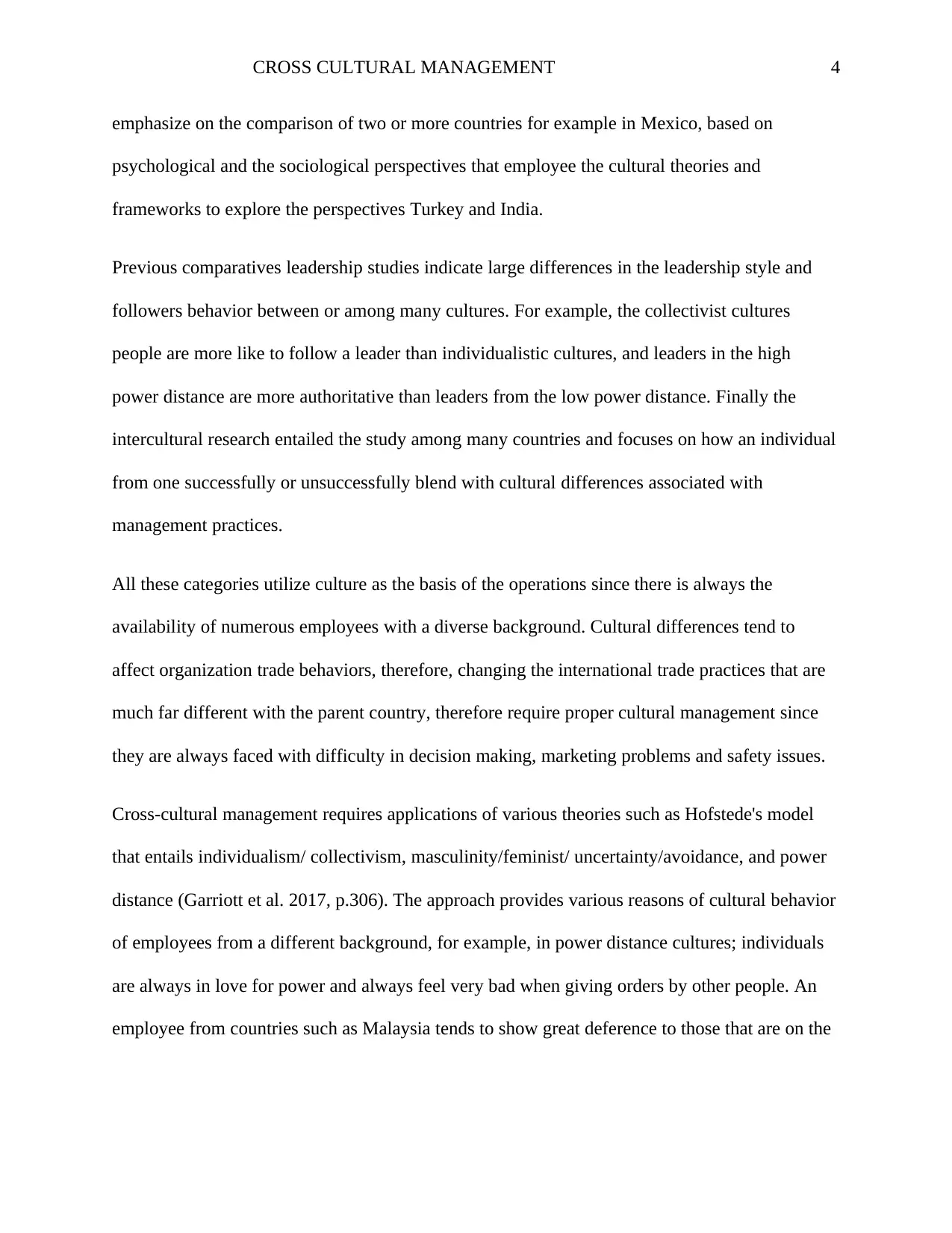
CROSS CULTURAL MANAGEMENT 4
emphasize on the comparison of two or more countries for example in Mexico, based on
psychological and the sociological perspectives that employee the cultural theories and
frameworks to explore the perspectives Turkey and India.
Previous comparatives leadership studies indicate large differences in the leadership style and
followers behavior between or among many cultures. For example, the collectivist cultures
people are more like to follow a leader than individualistic cultures, and leaders in the high
power distance are more authoritative than leaders from the low power distance. Finally the
intercultural research entailed the study among many countries and focuses on how an individual
from one successfully or unsuccessfully blend with cultural differences associated with
management practices.
All these categories utilize culture as the basis of the operations since there is always the
availability of numerous employees with a diverse background. Cultural differences tend to
affect organization trade behaviors, therefore, changing the international trade practices that are
much far different with the parent country, therefore require proper cultural management since
they are always faced with difficulty in decision making, marketing problems and safety issues.
Cross-cultural management requires applications of various theories such as Hofstede's model
that entails individualism/ collectivism, masculinity/feminist/ uncertainty/avoidance, and power
distance (Garriott et al. 2017, p.306). The approach provides various reasons of cultural behavior
of employees from a different background, for example, in power distance cultures; individuals
are always in love for power and always feel very bad when giving orders by other people. An
employee from countries such as Malaysia tends to show great deference to those that are on the
emphasize on the comparison of two or more countries for example in Mexico, based on
psychological and the sociological perspectives that employee the cultural theories and
frameworks to explore the perspectives Turkey and India.
Previous comparatives leadership studies indicate large differences in the leadership style and
followers behavior between or among many cultures. For example, the collectivist cultures
people are more like to follow a leader than individualistic cultures, and leaders in the high
power distance are more authoritative than leaders from the low power distance. Finally the
intercultural research entailed the study among many countries and focuses on how an individual
from one successfully or unsuccessfully blend with cultural differences associated with
management practices.
All these categories utilize culture as the basis of the operations since there is always the
availability of numerous employees with a diverse background. Cultural differences tend to
affect organization trade behaviors, therefore, changing the international trade practices that are
much far different with the parent country, therefore require proper cultural management since
they are always faced with difficulty in decision making, marketing problems and safety issues.
Cross-cultural management requires applications of various theories such as Hofstede's model
that entails individualism/ collectivism, masculinity/feminist/ uncertainty/avoidance, and power
distance (Garriott et al. 2017, p.306). The approach provides various reasons of cultural behavior
of employees from a different background, for example, in power distance cultures; individuals
are always in love for power and always feel very bad when giving orders by other people. An
employee from countries such as Malaysia tends to show great deference to those that are on the
Paraphrase This Document
Need a fresh take? Get an instant paraphrase of this document with our AI Paraphraser
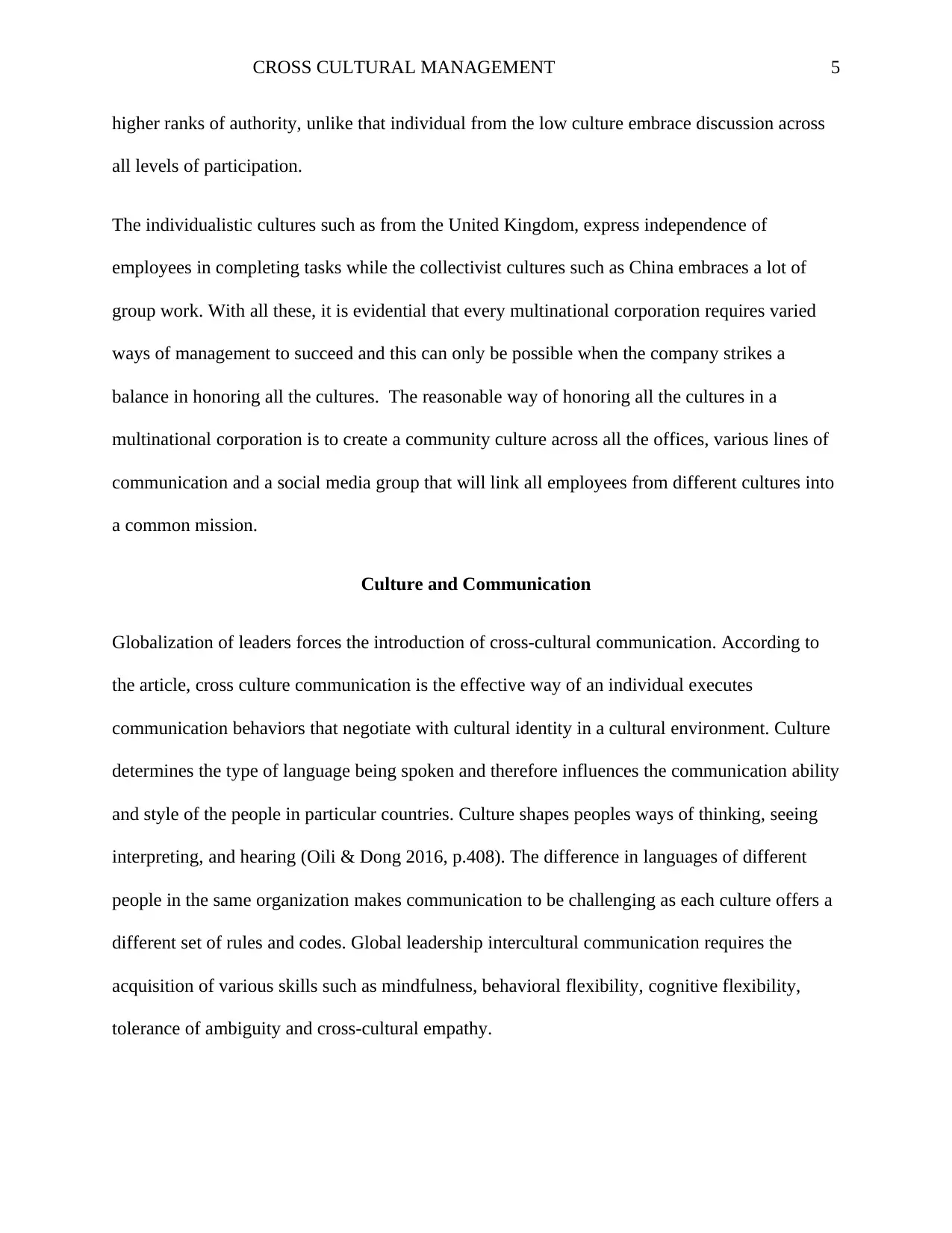
CROSS CULTURAL MANAGEMENT 5
higher ranks of authority, unlike that individual from the low culture embrace discussion across
all levels of participation.
The individualistic cultures such as from the United Kingdom, express independence of
employees in completing tasks while the collectivist cultures such as China embraces a lot of
group work. With all these, it is evidential that every multinational corporation requires varied
ways of management to succeed and this can only be possible when the company strikes a
balance in honoring all the cultures. The reasonable way of honoring all the cultures in a
multinational corporation is to create a community culture across all the offices, various lines of
communication and a social media group that will link all employees from different cultures into
a common mission.
Culture and Communication
Globalization of leaders forces the introduction of cross-cultural communication. According to
the article, cross culture communication is the effective way of an individual executes
communication behaviors that negotiate with cultural identity in a cultural environment. Culture
determines the type of language being spoken and therefore influences the communication ability
and style of the people in particular countries. Culture shapes peoples ways of thinking, seeing
interpreting, and hearing (Oili & Dong 2016, p.408). The difference in languages of different
people in the same organization makes communication to be challenging as each culture offers a
different set of rules and codes. Global leadership intercultural communication requires the
acquisition of various skills such as mindfulness, behavioral flexibility, cognitive flexibility,
tolerance of ambiguity and cross-cultural empathy.
higher ranks of authority, unlike that individual from the low culture embrace discussion across
all levels of participation.
The individualistic cultures such as from the United Kingdom, express independence of
employees in completing tasks while the collectivist cultures such as China embraces a lot of
group work. With all these, it is evidential that every multinational corporation requires varied
ways of management to succeed and this can only be possible when the company strikes a
balance in honoring all the cultures. The reasonable way of honoring all the cultures in a
multinational corporation is to create a community culture across all the offices, various lines of
communication and a social media group that will link all employees from different cultures into
a common mission.
Culture and Communication
Globalization of leaders forces the introduction of cross-cultural communication. According to
the article, cross culture communication is the effective way of an individual executes
communication behaviors that negotiate with cultural identity in a cultural environment. Culture
determines the type of language being spoken and therefore influences the communication ability
and style of the people in particular countries. Culture shapes peoples ways of thinking, seeing
interpreting, and hearing (Oili & Dong 2016, p.408). The difference in languages of different
people in the same organization makes communication to be challenging as each culture offers a
different set of rules and codes. Global leadership intercultural communication requires the
acquisition of various skills such as mindfulness, behavioral flexibility, cognitive flexibility,
tolerance of ambiguity and cross-cultural empathy.
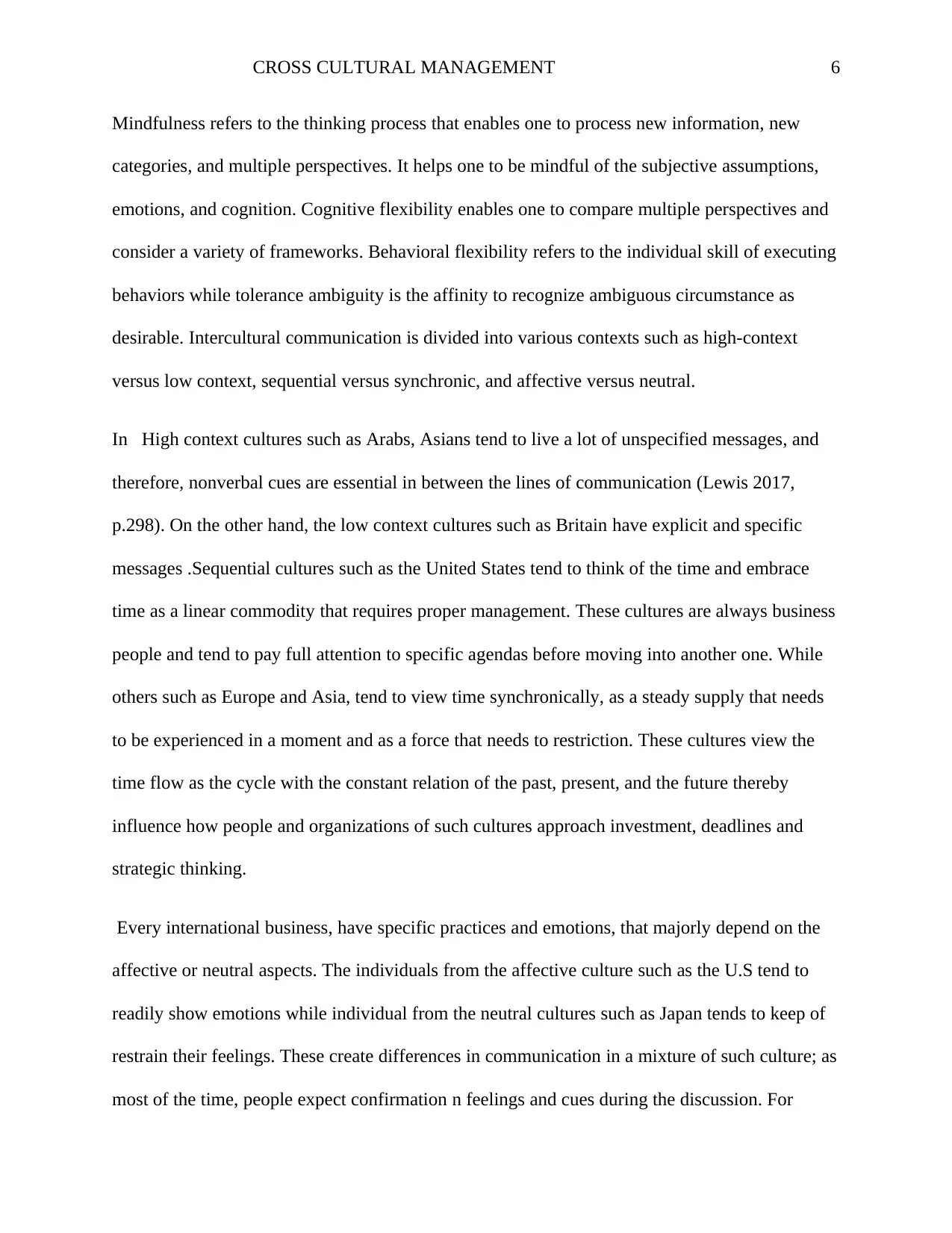
CROSS CULTURAL MANAGEMENT 6
Mindfulness refers to the thinking process that enables one to process new information, new
categories, and multiple perspectives. It helps one to be mindful of the subjective assumptions,
emotions, and cognition. Cognitive flexibility enables one to compare multiple perspectives and
consider a variety of frameworks. Behavioral flexibility refers to the individual skill of executing
behaviors while tolerance ambiguity is the affinity to recognize ambiguous circumstance as
desirable. Intercultural communication is divided into various contexts such as high-context
versus low context, sequential versus synchronic, and affective versus neutral.
In High context cultures such as Arabs, Asians tend to live a lot of unspecified messages, and
therefore, nonverbal cues are essential in between the lines of communication (Lewis 2017,
p.298). On the other hand, the low context cultures such as Britain have explicit and specific
messages .Sequential cultures such as the United States tend to think of the time and embrace
time as a linear commodity that requires proper management. These cultures are always business
people and tend to pay full attention to specific agendas before moving into another one. While
others such as Europe and Asia, tend to view time synchronically, as a steady supply that needs
to be experienced in a moment and as a force that needs to restriction. These cultures view the
time flow as the cycle with the constant relation of the past, present, and the future thereby
influence how people and organizations of such cultures approach investment, deadlines and
strategic thinking.
Every international business, have specific practices and emotions, that majorly depend on the
affective or neutral aspects. The individuals from the affective culture such as the U.S tend to
readily show emotions while individual from the neutral cultures such as Japan tends to keep of
restrain their feelings. These create differences in communication in a mixture of such culture; as
most of the time, people expect confirmation n feelings and cues during the discussion. For
Mindfulness refers to the thinking process that enables one to process new information, new
categories, and multiple perspectives. It helps one to be mindful of the subjective assumptions,
emotions, and cognition. Cognitive flexibility enables one to compare multiple perspectives and
consider a variety of frameworks. Behavioral flexibility refers to the individual skill of executing
behaviors while tolerance ambiguity is the affinity to recognize ambiguous circumstance as
desirable. Intercultural communication is divided into various contexts such as high-context
versus low context, sequential versus synchronic, and affective versus neutral.
In High context cultures such as Arabs, Asians tend to live a lot of unspecified messages, and
therefore, nonverbal cues are essential in between the lines of communication (Lewis 2017,
p.298). On the other hand, the low context cultures such as Britain have explicit and specific
messages .Sequential cultures such as the United States tend to think of the time and embrace
time as a linear commodity that requires proper management. These cultures are always business
people and tend to pay full attention to specific agendas before moving into another one. While
others such as Europe and Asia, tend to view time synchronically, as a steady supply that needs
to be experienced in a moment and as a force that needs to restriction. These cultures view the
time flow as the cycle with the constant relation of the past, present, and the future thereby
influence how people and organizations of such cultures approach investment, deadlines and
strategic thinking.
Every international business, have specific practices and emotions, that majorly depend on the
affective or neutral aspects. The individuals from the affective culture such as the U.S tend to
readily show emotions while individual from the neutral cultures such as Japan tends to keep of
restrain their feelings. These create differences in communication in a mixture of such culture; as
most of the time, people expect confirmation n feelings and cues during the discussion. For
⊘ This is a preview!⊘
Do you want full access?
Subscribe today to unlock all pages.

Trusted by 1+ million students worldwide
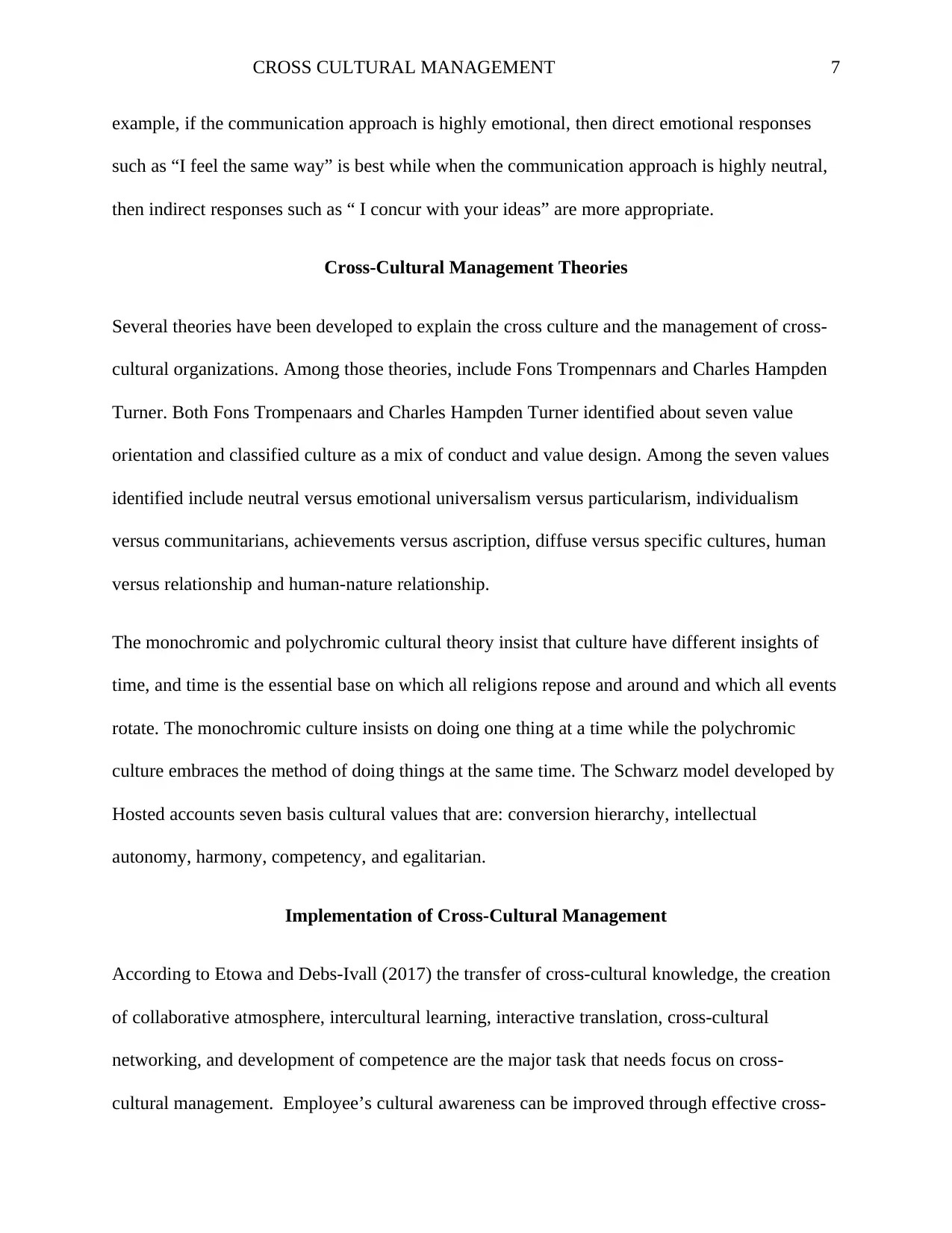
CROSS CULTURAL MANAGEMENT 7
example, if the communication approach is highly emotional, then direct emotional responses
such as “I feel the same way” is best while when the communication approach is highly neutral,
then indirect responses such as “ I concur with your ideas” are more appropriate.
Cross-Cultural Management Theories
Several theories have been developed to explain the cross culture and the management of cross-
cultural organizations. Among those theories, include Fons Trompennars and Charles Hampden
Turner. Both Fons Trompenaars and Charles Hampden Turner identified about seven value
orientation and classified culture as a mix of conduct and value design. Among the seven values
identified include neutral versus emotional universalism versus particularism, individualism
versus communitarians, achievements versus ascription, diffuse versus specific cultures, human
versus relationship and human-nature relationship.
The monochromic and polychromic cultural theory insist that culture have different insights of
time, and time is the essential base on which all religions repose and around and which all events
rotate. The monochromic culture insists on doing one thing at a time while the polychromic
culture embraces the method of doing things at the same time. The Schwarz model developed by
Hosted accounts seven basis cultural values that are: conversion hierarchy, intellectual
autonomy, harmony, competency, and egalitarian.
Implementation of Cross-Cultural Management
According to Etowa and Debs-Ivall (2017) the transfer of cross-cultural knowledge, the creation
of collaborative atmosphere, intercultural learning, interactive translation, cross-cultural
networking, and development of competence are the major task that needs focus on cross-
cultural management. Employee’s cultural awareness can be improved through effective cross-
example, if the communication approach is highly emotional, then direct emotional responses
such as “I feel the same way” is best while when the communication approach is highly neutral,
then indirect responses such as “ I concur with your ideas” are more appropriate.
Cross-Cultural Management Theories
Several theories have been developed to explain the cross culture and the management of cross-
cultural organizations. Among those theories, include Fons Trompennars and Charles Hampden
Turner. Both Fons Trompenaars and Charles Hampden Turner identified about seven value
orientation and classified culture as a mix of conduct and value design. Among the seven values
identified include neutral versus emotional universalism versus particularism, individualism
versus communitarians, achievements versus ascription, diffuse versus specific cultures, human
versus relationship and human-nature relationship.
The monochromic and polychromic cultural theory insist that culture have different insights of
time, and time is the essential base on which all religions repose and around and which all events
rotate. The monochromic culture insists on doing one thing at a time while the polychromic
culture embraces the method of doing things at the same time. The Schwarz model developed by
Hosted accounts seven basis cultural values that are: conversion hierarchy, intellectual
autonomy, harmony, competency, and egalitarian.
Implementation of Cross-Cultural Management
According to Etowa and Debs-Ivall (2017) the transfer of cross-cultural knowledge, the creation
of collaborative atmosphere, intercultural learning, interactive translation, cross-cultural
networking, and development of competence are the major task that needs focus on cross-
cultural management. Employee’s cultural awareness can be improved through effective cross-
Paraphrase This Document
Need a fresh take? Get an instant paraphrase of this document with our AI Paraphraser
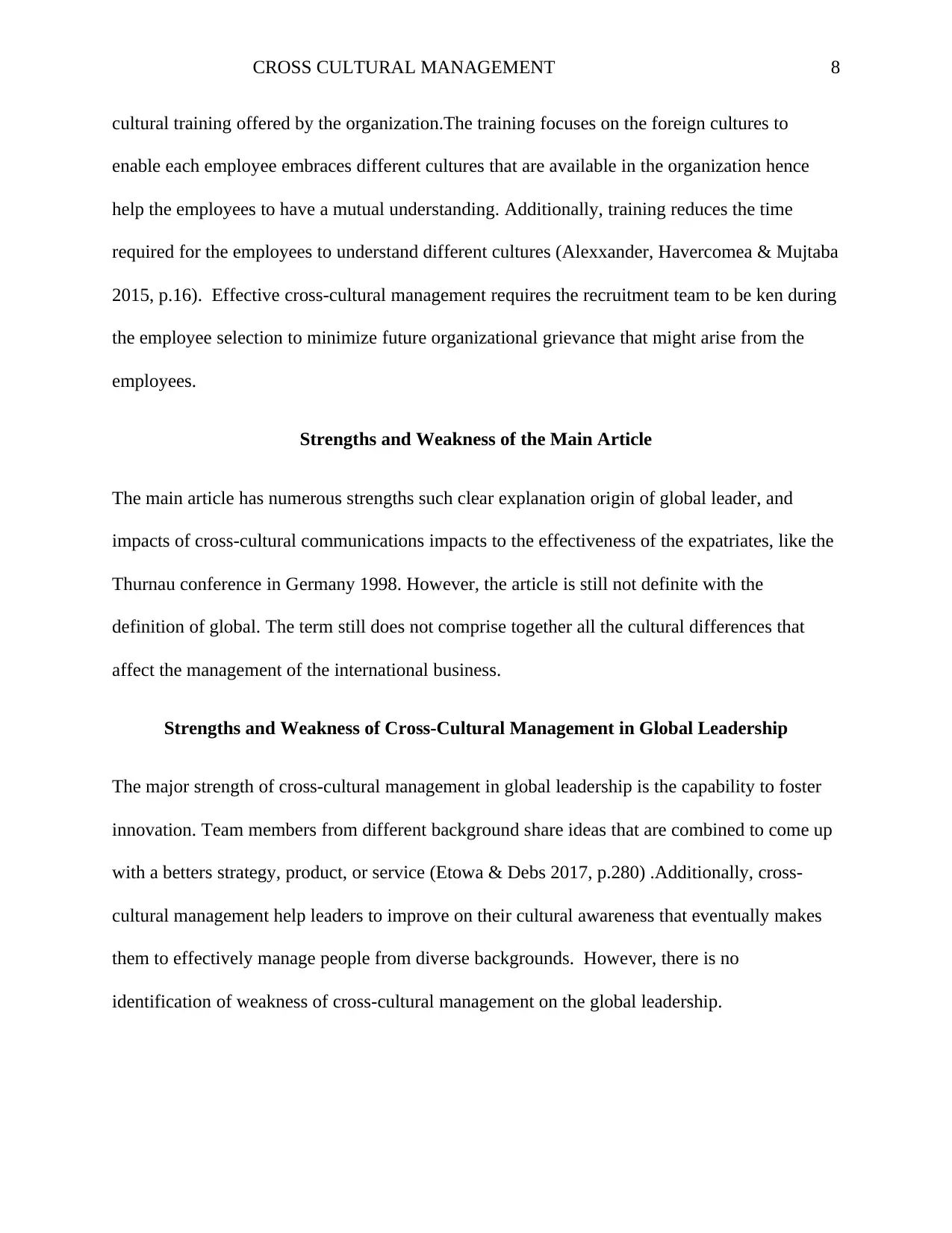
CROSS CULTURAL MANAGEMENT 8
cultural training offered by the organization.The training focuses on the foreign cultures to
enable each employee embraces different cultures that are available in the organization hence
help the employees to have a mutual understanding. Additionally, training reduces the time
required for the employees to understand different cultures (Alexxander, Havercomea & Mujtaba
2015, p.16). Effective cross-cultural management requires the recruitment team to be ken during
the employee selection to minimize future organizational grievance that might arise from the
employees.
Strengths and Weakness of the Main Article
The main article has numerous strengths such clear explanation origin of global leader, and
impacts of cross-cultural communications impacts to the effectiveness of the expatriates, like the
Thurnau conference in Germany 1998. However, the article is still not definite with the
definition of global. The term still does not comprise together all the cultural differences that
affect the management of the international business.
Strengths and Weakness of Cross-Cultural Management in Global Leadership
The major strength of cross-cultural management in global leadership is the capability to foster
innovation. Team members from different background share ideas that are combined to come up
with a betters strategy, product, or service (Etowa & Debs 2017, p.280) .Additionally, cross-
cultural management help leaders to improve on their cultural awareness that eventually makes
them to effectively manage people from diverse backgrounds. However, there is no
identification of weakness of cross-cultural management on the global leadership.
cultural training offered by the organization.The training focuses on the foreign cultures to
enable each employee embraces different cultures that are available in the organization hence
help the employees to have a mutual understanding. Additionally, training reduces the time
required for the employees to understand different cultures (Alexxander, Havercomea & Mujtaba
2015, p.16). Effective cross-cultural management requires the recruitment team to be ken during
the employee selection to minimize future organizational grievance that might arise from the
employees.
Strengths and Weakness of the Main Article
The main article has numerous strengths such clear explanation origin of global leader, and
impacts of cross-cultural communications impacts to the effectiveness of the expatriates, like the
Thurnau conference in Germany 1998. However, the article is still not definite with the
definition of global. The term still does not comprise together all the cultural differences that
affect the management of the international business.
Strengths and Weakness of Cross-Cultural Management in Global Leadership
The major strength of cross-cultural management in global leadership is the capability to foster
innovation. Team members from different background share ideas that are combined to come up
with a betters strategy, product, or service (Etowa & Debs 2017, p.280) .Additionally, cross-
cultural management help leaders to improve on their cultural awareness that eventually makes
them to effectively manage people from diverse backgrounds. However, there is no
identification of weakness of cross-cultural management on the global leadership.
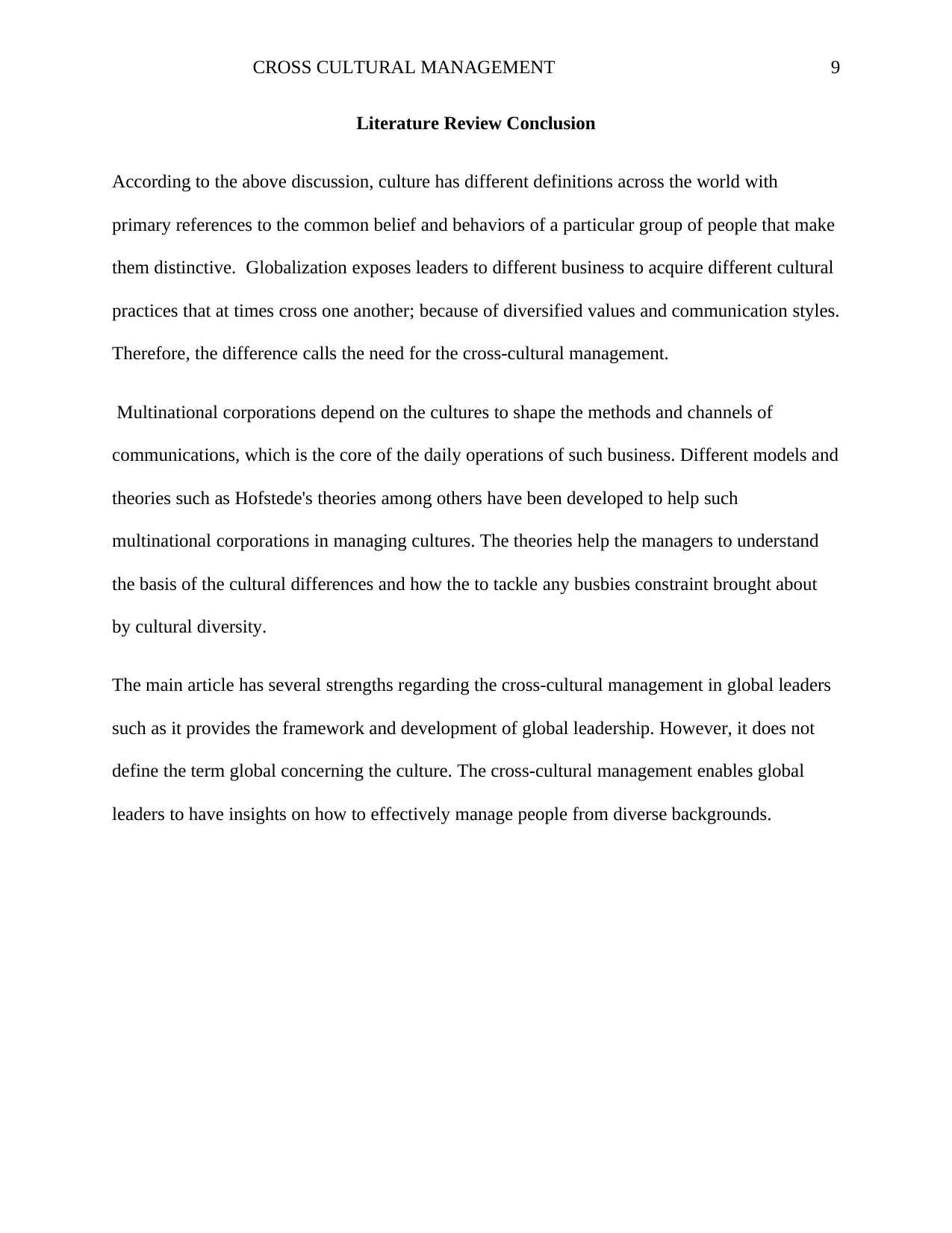
CROSS CULTURAL MANAGEMENT 9
Literature Review Conclusion
According to the above discussion, culture has different definitions across the world with
primary references to the common belief and behaviors of a particular group of people that make
them distinctive. Globalization exposes leaders to different business to acquire different cultural
practices that at times cross one another; because of diversified values and communication styles.
Therefore, the difference calls the need for the cross-cultural management.
Multinational corporations depend on the cultures to shape the methods and channels of
communications, which is the core of the daily operations of such business. Different models and
theories such as Hofstede's theories among others have been developed to help such
multinational corporations in managing cultures. The theories help the managers to understand
the basis of the cultural differences and how the to tackle any busbies constraint brought about
by cultural diversity.
The main article has several strengths regarding the cross-cultural management in global leaders
such as it provides the framework and development of global leadership. However, it does not
define the term global concerning the culture. The cross-cultural management enables global
leaders to have insights on how to effectively manage people from diverse backgrounds.
Literature Review Conclusion
According to the above discussion, culture has different definitions across the world with
primary references to the common belief and behaviors of a particular group of people that make
them distinctive. Globalization exposes leaders to different business to acquire different cultural
practices that at times cross one another; because of diversified values and communication styles.
Therefore, the difference calls the need for the cross-cultural management.
Multinational corporations depend on the cultures to shape the methods and channels of
communications, which is the core of the daily operations of such business. Different models and
theories such as Hofstede's theories among others have been developed to help such
multinational corporations in managing cultures. The theories help the managers to understand
the basis of the cultural differences and how the to tackle any busbies constraint brought about
by cultural diversity.
The main article has several strengths regarding the cross-cultural management in global leaders
such as it provides the framework and development of global leadership. However, it does not
define the term global concerning the culture. The cross-cultural management enables global
leaders to have insights on how to effectively manage people from diverse backgrounds.
⊘ This is a preview!⊘
Do you want full access?
Subscribe today to unlock all pages.

Trusted by 1+ million students worldwide
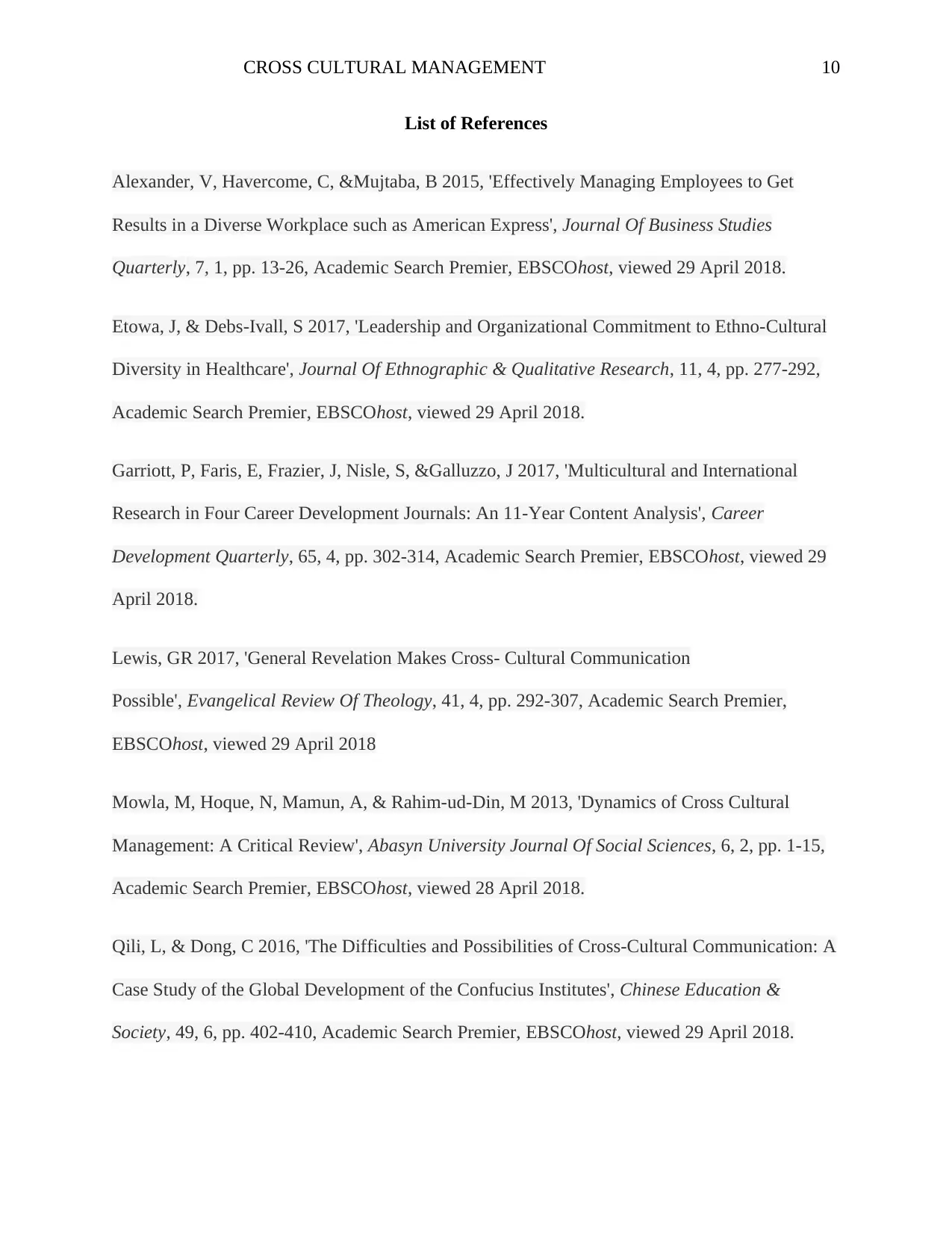
CROSS CULTURAL MANAGEMENT 10
List of References
Alexander, V, Havercome, C, &Mujtaba, B 2015, 'Effectively Managing Employees to Get
Results in a Diverse Workplace such as American Express', Journal Of Business Studies
Quarterly, 7, 1, pp. 13-26, Academic Search Premier, EBSCOhost, viewed 29 April 2018.
Etowa, J, & Debs-Ivall, S 2017, 'Leadership and Organizational Commitment to Ethno-Cultural
Diversity in Healthcare', Journal Of Ethnographic & Qualitative Research, 11, 4, pp. 277-292,
Academic Search Premier, EBSCOhost, viewed 29 April 2018.
Garriott, P, Faris, E, Frazier, J, Nisle, S, &Galluzzo, J 2017, 'Multicultural and International
Research in Four Career Development Journals: An 11-Year Content Analysis', Career
Development Quarterly, 65, 4, pp. 302-314, Academic Search Premier, EBSCOhost, viewed 29
April 2018.
Lewis, GR 2017, 'General Revelation Makes Cross- Cultural Communication
Possible', Evangelical Review Of Theology, 41, 4, pp. 292-307, Academic Search Premier,
EBSCOhost, viewed 29 April 2018
Mowla, M, Hoque, N, Mamun, A, & Rahim-ud-Din, M 2013, 'Dynamics of Cross Cultural
Management: A Critical Review', Abasyn University Journal Of Social Sciences, 6, 2, pp. 1-15,
Academic Search Premier, EBSCOhost, viewed 28 April 2018.
Qili, L, & Dong, C 2016, 'The Difficulties and Possibilities of Cross-Cultural Communication: A
Case Study of the Global Development of the Confucius Institutes', Chinese Education &
Society, 49, 6, pp. 402-410, Academic Search Premier, EBSCOhost, viewed 29 April 2018.
List of References
Alexander, V, Havercome, C, &Mujtaba, B 2015, 'Effectively Managing Employees to Get
Results in a Diverse Workplace such as American Express', Journal Of Business Studies
Quarterly, 7, 1, pp. 13-26, Academic Search Premier, EBSCOhost, viewed 29 April 2018.
Etowa, J, & Debs-Ivall, S 2017, 'Leadership and Organizational Commitment to Ethno-Cultural
Diversity in Healthcare', Journal Of Ethnographic & Qualitative Research, 11, 4, pp. 277-292,
Academic Search Premier, EBSCOhost, viewed 29 April 2018.
Garriott, P, Faris, E, Frazier, J, Nisle, S, &Galluzzo, J 2017, 'Multicultural and International
Research in Four Career Development Journals: An 11-Year Content Analysis', Career
Development Quarterly, 65, 4, pp. 302-314, Academic Search Premier, EBSCOhost, viewed 29
April 2018.
Lewis, GR 2017, 'General Revelation Makes Cross- Cultural Communication
Possible', Evangelical Review Of Theology, 41, 4, pp. 292-307, Academic Search Premier,
EBSCOhost, viewed 29 April 2018
Mowla, M, Hoque, N, Mamun, A, & Rahim-ud-Din, M 2013, 'Dynamics of Cross Cultural
Management: A Critical Review', Abasyn University Journal Of Social Sciences, 6, 2, pp. 1-15,
Academic Search Premier, EBSCOhost, viewed 28 April 2018.
Qili, L, & Dong, C 2016, 'The Difficulties and Possibilities of Cross-Cultural Communication: A
Case Study of the Global Development of the Confucius Institutes', Chinese Education &
Society, 49, 6, pp. 402-410, Academic Search Premier, EBSCOhost, viewed 29 April 2018.
Paraphrase This Document
Need a fresh take? Get an instant paraphrase of this document with our AI Paraphraser
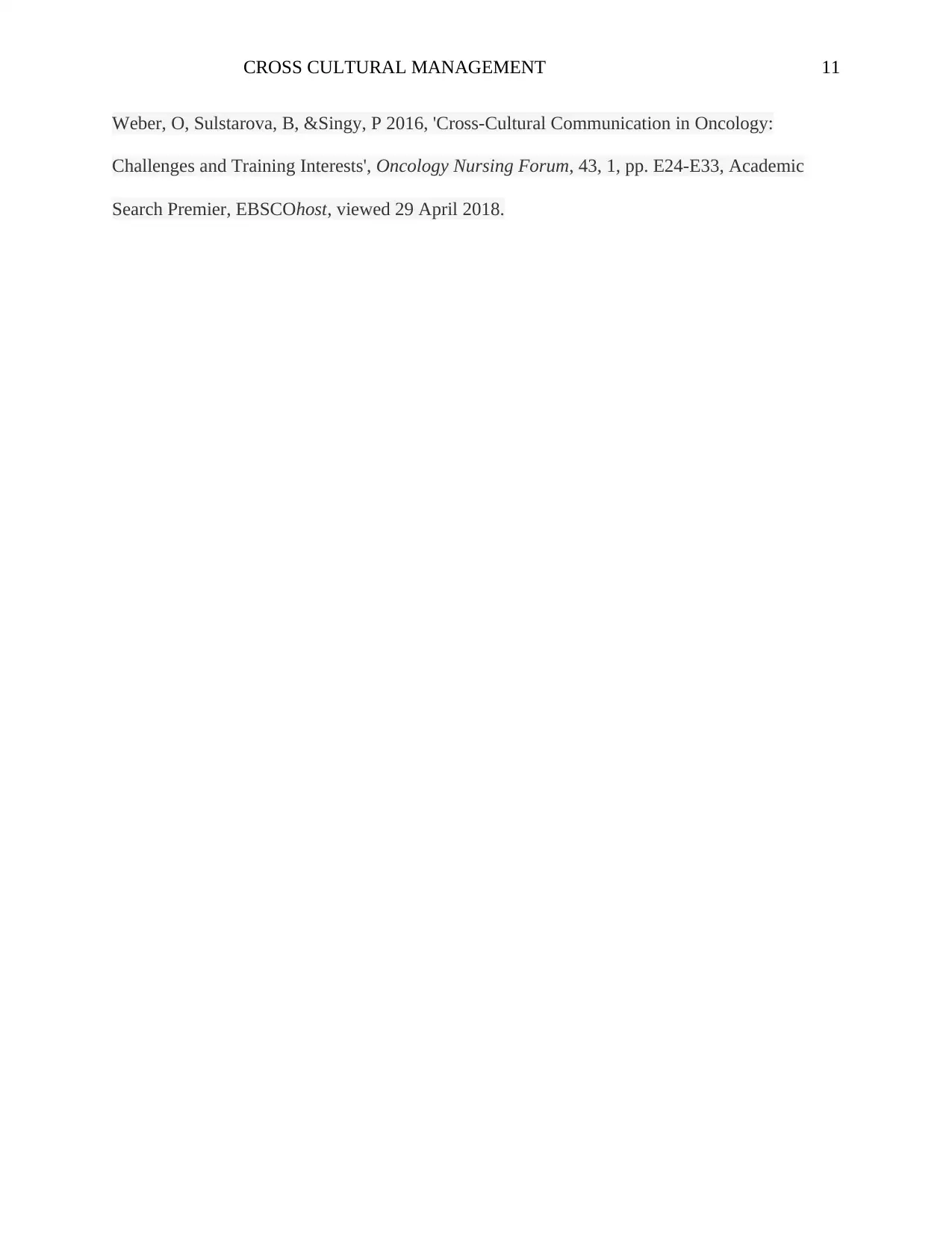
CROSS CULTURAL MANAGEMENT 11
Weber, O, Sulstarova, B, &Singy, P 2016, 'Cross-Cultural Communication in Oncology:
Challenges and Training Interests', Oncology Nursing Forum, 43, 1, pp. E24-E33, Academic
Search Premier, EBSCOhost, viewed 29 April 2018.
Weber, O, Sulstarova, B, &Singy, P 2016, 'Cross-Cultural Communication in Oncology:
Challenges and Training Interests', Oncology Nursing Forum, 43, 1, pp. E24-E33, Academic
Search Premier, EBSCOhost, viewed 29 April 2018.
1 out of 11
Related Documents
Your All-in-One AI-Powered Toolkit for Academic Success.
+13062052269
info@desklib.com
Available 24*7 on WhatsApp / Email
![[object Object]](/_next/static/media/star-bottom.7253800d.svg)
Unlock your academic potential
Copyright © 2020–2026 A2Z Services. All Rights Reserved. Developed and managed by ZUCOL.





